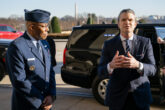July 27, 2020
Want to Recruit Women? Address Sexual Assault and Harassment
At a time when the military is in a “war for talent,” ongoing instances of harassment and violence against women will continue to suppress young women’s interest in service, leaving half the talent pool less accessible. The murder of Vanessa Guillén, and her family’s report that she disclosed instances of sexually harassment, has once again called to light the fundamental culture change needed across the military. The #IAmVanessaGuillen and #JusticeforVanessaGuillen resurgence of the military #metoo movement again raises the question of why women should serve in the military, which has regularly been shown to be a toxic environment for so many of them, particularly in the junior enlisted ranks.
If the military is serious about recruiting talent, which must include recruiting women as the number of eligible men continues to fall, real gains need to be seen.
The military sometimes claims sexual assault, sexual harassment, and gender discrimination are simply manifestations of a broader societal problem; while the rate of sexual violence has fallen nationwide in the past two decades, one in six women has been the victim of an attempted or completed rape in her lifetime. On college campuses, with a high concentration of young people like the military, one in five women or 23 percent of undergraduate women experience sexual assault. However, gender discrimination is also a military problem. As a country, we hold service members and the military institution to a higher standard, entrusting them with the defense of the nation and giving them the authority to use violence. Sexual assault and harassment stand out because while rates of other violent crimes are lower in the military (the military rape differential), the rate of sexual assault in the military is comparable, meaning the ratio is substantially larger.
Read the full article in Inkstick.
More from CNAS
-
National Security Human Capital Program
Defending the Army’s Command Assessment ProgramThe concept for CAP — developed during the first Trump administration — benefited from the guidance, input and oversight from the foremost scholar and practitioner on military...
By Katherine L. Kuzminski
-
National Security Human Capital Program
‘Women Don’t Just Achieve…They Excel’: Fmr. Marine Corps Attack PilotDr. Kyleanne Hunter, former Marine Corps attack pilot and CEO of Iraq & Afghanistan Veterans of America, says “women are the fastest growing group of veterans” and “the fastes...
By Dr. Kyleanne Hunter
-
National Security Human Capital Program
Could the U.S. Bring Back the Draft?In this episode of At the Boundary, GNSI’s Dr. Guido Rossi sits down with Katherine Kuzminski, Director of Studies at the Center for a New American Security (CNAS), to explore...
By Katherine L. Kuzminski
-
National Security Human Capital Program
Hegseth Brings the Culture War to CombatThe fundamental challenge of military leadership lies in creating cohesive teams that can work together in an environment of mortal risk and, when called upon to do so, use le...
By Dr. Jason Dempsey




